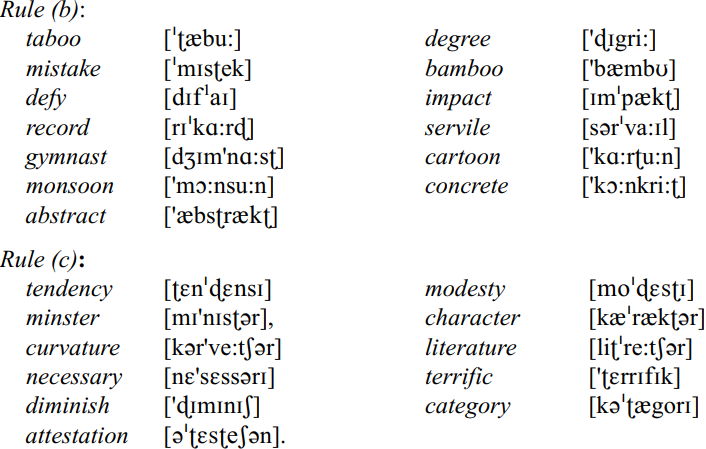


 Grammar
Grammar
 Tenses
Tenses
 Present
Present
 Past
Past
 Future
Future
 Parts Of Speech
Parts Of Speech
 Nouns
Nouns
 Verbs
Verbs
 Adverbs
Adverbs
 Adjectives
Adjectives
 Pronouns
Pronouns
 Pre Position
Pre Position
 Preposition by function
Preposition by function 
 Preposition by construction
Preposition by construction
 Conjunctions
Conjunctions
 Interjections
Interjections
 Grammar Rules
Grammar Rules
 Linguistics
Linguistics
 Semantics
Semantics
 Pragmatics
Pragmatics
 Reading Comprehension
Reading Comprehension|
Read More
Date: 2024-05-01
Date: 2024-04-20
Date: 23-3-2022
|
Word accentuation in IndE shows a heavy influence of the filter language(s). It is observed that in IndE a syllable of a word is more prominent than in RP. A careful examination shows that there is significant correlation between the weight and position of syllables within a word and their prominence. The problem can be explained by accepting the tripartite division of syllable types in terms of their weight: (a) Light = (C)V, (b) Heavy = (C)V: /VC, and (c) Extra–heavy = (C)V: C/(C)VCC.
The following rules of accentuation broadly appear to apply in IndE:
(a) All monosyllabic words are accented irrespective of the quantity of the syllable.
(b) In bisyllabic words the primary accent falls on the penultimate syllable if it is not followed by an extra–heavy syllable, otherwise the primary stress would full on the ultimate syllable.
(c) In trisyllabic words the primary accent falls on the penultimate syllable if it is heavy by nature or position, otherwise it falls on the antepenultimate syllable.
The above rules can account for the placement of primary accent in a word of IndE. The first of these rules leads to the tendency of providing relatively strong stress to weak syllables such as in auxiliary verb forms, articles etc. Rules (b) and (c) go on to provide primary stress to a syllable in a polysyllabic word. Thus, for the application of rules (b) and (c) the following examples can be viewed:

In the case of compounds the leftmost primary stress is generally retained. Thus:

As a result of the rules of accentuation many times the shift of accent due to grammatical factors is not observable. Thus the noun and verb form often remain the same: permit  ; transfer
; transfer  ; impact
; impact  ; protest
; protest  .
.
|
|
|
|
علامات بسيطة في جسدك قد تنذر بمرض "قاتل"
|
|
|
|
|
|
|
أول صور ثلاثية الأبعاد للغدة الزعترية البشرية
|
|
|
|
|
|
|
مكتبة أمّ البنين النسويّة تصدر العدد 212 من مجلّة رياض الزهراء (عليها السلام)
|
|
|